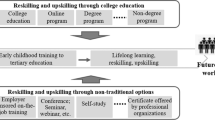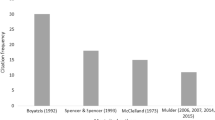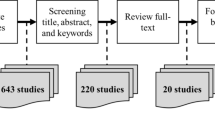Abstract
Industry 4.0 is a term that represents the radical transformation of Industry that has resulted from the integration of emerging technologies. It implies that we are witnessing the proximity of the Fourth Industrial Revolution. Industry 4.0 aims to enable intelligent factories to produce personalized output utilizing greener and more efficient processes. However, to accomplish this, manufacturers must overcome several barriers, such as the lack of qualified talent to develop and manage various high-tech systems. This deficiency means that Industry 4.0 demands a change in the labor market, explicitly requiring trained professionals who have the competencies and skills to thrive in this new environment. What should a set of competencies be in the modern professional profiles? In this work, we review the required competencies, the technologies that aid in developing them, and the methods of assessing them.


Similar content being viewed by others
References
Abell, J.A., Chakraborty, D., Escobar, C.A., Im, K.H., Wegner, D.M., Wincek, M.A.: Big Data-driven manufacturing-process-monitoring-for-quality philosophy. J. Manuf. Sci. Eng. 139(10), 1–12 (2017)
Antosz, K.: Maintenance—identification and analysis of the competency gap. Eksploatacja i Niezawodnosc 20(3), 484–494 (2018)
Atobishi, T., Gábor Szalay, Z., Bayraktar, S.: Cloud computing and Big Data in the context of Industry 4.0 : opportunities and challenges. In: IISES Annual Conference, pp. 1–8 (2018)
Bakuei, M., Flores, R., Kropotov, V., Yarochkin, F.: Securing smart factories threats to manufacturing environments in the era of Industry 4.0. Trend Micro Res. 41. https://documents.trendmicro.com/assets/white_papers/wp-threats-to-manufacturing-environments-in-the-era-of-industry-4.pdf (2019). Accessed Nov 2019
Basl, J.: Companies on the way to Industry 4.0 and their readiness. J. Syst. Integr. 9(3), 3–6 (2018)
Basl, J., Doucek, P.: A metamodel for evaluating enterprise readiness in the context of Industry 4.0. Information (Switzerland) 10(3), 1–13 (2019)
Baybutt, P.: Implement a competency management system for process safety. http://www.hydrocarbonprocessing.com/magazine/2016/july-2016/environment-and-safety/implement-a-competency-management-system-for-process-safety (2016). Accessed 10 March 10
Benesova, A., Tupa, J.: Requirements for education and qualification of people in Industry 4.0. Procedia Manuf. 11, 2195–2202 (2017)
Bongomin, O., Ocen, G.G., Nganyi1, E.O., Musinguzi1, A., Omara, T.: Exponential disruptive technologies and the required skills of Industry 4.0: a review. Preprints (October), pp. 1–22 (2019)
Bryner, M.: Smart manufacturing: the next revolution. CEP Mag. 108, 4–12 (2012)
Cachay, J., Abele, E.: Developing competencies for continuous improvement processes on the shop floor through learning factories—conceptual design and empirical validation. Procedia CIRP 3(1), 638–643 (2012)
Capgemini Consulting Group: Asset performance management maturity model. Strategic roadmap to digital manufacturing. www.capgemini.com/wp-content/uploads/2017/08/asset_performance_management_maturity_model_paper_web_version.pdf (2017). Accessed Nov 2019
Cimini, C., Pezzotta, G., Pinto, R., Cavalieri, S.: Industry 4.0 technologies impacts in the manufacturing and supply chain landscape: an overview. In: International Workshop on Service Orientation in Holonic and Multi-Agent Manufacturing, pp. 109–120 (2018)
Coskun, S., Kayıkcı, Y., Gençay, E.: Adapting engineering education to Industry 4.0 vision. Technologies 7(1), 1–10 (2019)
Cotet, G.B., Balgiu, B.A., Negrea, V.C.Z.: Assessment procedure for the soft skills requested by Industry 4.0. MATEC Web Conf. 121, 1–8 (2017)
Czech Minister of Industry and Trade. Are you ready for Industry 4.0?. firma4.cz/ (n.d.). Accessed 20 March 2020
De Pace, F., Manuri, F., Sanna, A.: Augmented reality in Industry 4.0. Am. J. Comput. Sci. Inf. Technol. 6(01), 1–7 (2018)
Díaz, M., FLores, B.: Competencies to adopt Industry 4.0 for operations management personnel at automotive parts suppliers in Nuevo Leon. In: International Conference on Industrial Engineering and Operations Management, vol. 2017, pp. 736–747 (2017)
Escobar, C.A., Abell, J.A., Hernández-de-Menéndez, M., Morales-Menendez, R.: Process-monitoring-for-quality—big models. Procedia Manuf. 26, 1167–1179 (2018)
Escobar, C.A., Wincek, M.A., Chakraborty, D., Morales-Menendez, R.: Process-monitoring-for-quality—applications. Manuf. Lett. 16, 14–17 (2018)
ETH Zurich (2018). Science technology and policy: the future of work. sec.ethz.ch/news-events/news/2018/06/science-techology-and-policy-the-future-of-work.html (2018). Accessed 19 Sept 2019
ETH Zurich: Welcome to the institute of virtual manufacturing. ivp.ethz.ch/en/ (2019). Accessed 19 Sept 2019
European Commission: Analytical underpinning for a new skills agenda for Europe. Brussels. www.parlament.gv.at/PAKT/EU/XXV/EU/10/73/EU_107327/imfname_10637287.pdf (2016). Accessed Dec 2019
European Union Agency for Network and Information Security: Good practices for security of internet of things in the context of smart manufacturing, (November), pp. 1–118. www.enisa.europa.eu/publications/good-practices-for-security-of-iot (2018). Accessed Jan 2020
EY: Sensors as drivers of Industry 4.0. A study in Germany, Switzerland, and Austria. www.ey.com/Publication/vwLUAssets/ey-at-studie-sensoren-treiber-industrie-40-2019/$FILE/EY.Studie-SensorsasdriversofIndustry4.0.pdf (2019). Accessed Nov 2019
Fitzgerald, J., Quasney, E.: Using autonomous robots to drive supply chain innovation. In: Deloitte, p. 12. www2.deloitte.com/content/dam/Deloitte/us/Documents/manufacturing/us-supply-chain-of-the-autonomous-robots.pdf (2017). Accessed Dec 2019
Fraunhofer Institute for Industrial Engineering IAO: How automation and digitization will change production. Stuttgart: Ingenics AG. www.ingenics.com/assets/downloads/en/internal/Industrie40_Studie_Ingenics_IAO_en_VM_Print.pdf (2014). Accessed Feb 2020
Gilchrist, A.: Industry 40: The Industrial Internet of Things. Springer, Nonthaburi (2016)
Gökalp, E., Şener, U., Eren, P.E.: Development of an assessment model for Industry 4. 0 : Industry 4. 0-MM. In: International Conference on Software Process Improvement and Capability Determination, pp. 1–15 (2017)
Grzybowska, K., Łupicka, A.: Key competencies for Industry 40. Econ. Manag. Innov. (ICEMI) 1(1), 250–253 (2017)
Hartmann, E., Bovenschulte, M.: Skills needs analysis for “Industry 4.0” based on roadmaps for smart systems. In: Using Technology Foresights for Identifying Future Skills Needs. Global Workshop Proceedings, pp. 24–36. SKOLKOVO Moscow School of Management and International Labour Organization, Moscow (2013)
Hecklau, F., Galeitzke, M., Flachs, S., Kohl, H.: Holistic Approach for human resource management in Industry 4.0. Procedia CIRP 54, 1–6 (2016)
Horst, D., Duvoisin, C., Almeida, R.: Additive manufacturing at Industry 40: a review. Int J. Eng. Technol. Res. 8(8), 3–8 (2018)
IBSA: Preparing for Industry 4.0—will digital skills be enough? Wellington Parade East Melbourne. ibsa.org.au/wp-content/uploads/2018/11/IBSA-Manufacturing-Preparing-for-Industry-4-will-digital-skills-be-enough.pdf (2018). Accessed Feb 2020
Jacob, D.: Quality 4.0 impact and strategy handbook. Getting digitally connected to transform quality management. LNS Research and SAS. nldalmia.in/enquiry/public/docs/quality-4-0-impact-strategy-109087_compressed.pdf (2017). Accessed Dec 2019
Karabegovic, I., Husak, E.: The role of industrial and service robots in the fourth industrial revolution with focus on China. J. Eng. Archit. 6(1), 67–75 (2018)
Koschnick, G.: The reference model Industrie 4.0 (RAMI 4.0). ZWEI – Die Elektroindustrie. przemysl-40.pl/wp-content/uploads/2010-The-Reference-Architectural-Model-Industrie-40.pdf (2015). Accessed Nov 2019
Krachtt, N.: The workforce implications of Industry 4.0: manufacturing workforce strategies to enable enterprise transformation. University of Wisconsin-Platteville. minds.wisconsin.edu/bitstream/handle/1793/78886/Krachtt%2CNoah.pdf?sequence=1&isAllowed=y (2018). Accessed Jan 2020
Lab Midwest: 6 Building Blocks of Industry 4.0 Education. labmidwest.com/6-building-blocks-of-industry-4-0-education/ (2019). Accessed 24 Jan 2020
Leyh, C., Bley, K., Schaffer, T., Forstenhausler, S.: SIMMI 4.0-a maturity model for classifying the enterprise-wide IT and software landscape focusing on Industry 4.0. In: Proceedings of the 2016 Federated Conference on Computer Science and Information Systems, 2016, vol. 8, pp. 1297–1302 (2016)
Liu, Y., Xu, X.: Industry 4.0 and cloud manufacturing: a comparative analysis. J. Manuf. Sci. Eng. 139(3), 1–8 (2017)
Machado, C.G., Winroth, M., Carlsson, D., Almström, P., Centerholt, V., Hallin, M.: Industry 4.0 readiness in manufacturing companies: challenges and enablers towards increased digitalization. Procedia CIRP 81(June), 1113–1118 (2019)
Malaysia Productivity Corporation: The race towards Industry 4.0. Selangor: Malaysia Productivity Corporation. www.mpc.gov.my/wp-content/uploads/2018/11/The-Race-Towards-Industry-4.0.pdf (2018). Accessed Feb 2020
Mangundjaya, W., Aprilianti, A., Poerwadi, N.: Developing employee’ s performance through competency assessment. In: The 2009 International Conference on Human Resource Development, pp. 115–124 (2009)
Massachusetts Adult Education: Microsoft Digital Literacy Assessment (n.d.). www.sabes.org/content/microsoft-digital-literacy-assessment. Accessed 17 Feb 2020
Ministry of International Trade and Industry of Malaysia: Industry4WRD Readiness Assessment. Kuala Lumpur: Ministry of Int Trade and Industry of Malaysia (n.d.). www.miti.gov.my/miti/resources/NationalPolicyonIndustry4.0/Industry4WRD_Booklet.pdf. Accessed Nov 2019
MIT: MakerLodge (2019). project-manus.mit.edu/makerlodge. Accessed 29 Aug 2019
MIT: Smart Manufacturing (2019). professional.mit.edu/programs/digital-plus-programs/course-offerings/smart-manufacturing. Accessed 30 Aug 2019
MITLGO. MIT Leaders for Global Operations (n.d.). lgo.mit.edu/. Accessed 29 Aug 2019
Mohamed, M.: Challenges and benefits of Industry 4.0: an overview. Int. J. Supply Oper. Manag. 5(3), 256–265 (2018)
Mourtzis, D., Vlachou, E., Dimitrakopoulos, G., Zogopoulos, V.: Cyber-physical systems and education 4.0: the teaching factory 4.0 concept. Procedia Manuf. 23, 129–134 (2018)
Müller, J.M.: Assessing the barriers to Industry 4.0 implementation from a workers’ perspective. IFAC PapersOnLine 13, 2189–2194 (2019)
Nagy, J., Oláh, J., Erdei, E., Máté, D., Popp, J.: The role and impact of Industry 4.0 and the Internet of Things on the business strategy of the value chain: the case of Hungary. Sustainability (Switzerland) 10, 1–25 (2018)
Observatory of Educational Innovation: Augmented and virtual reality. In: EduTrends, pp. 1–36 (2018). observatory.tec.mx/edu-trends/. Accessed Dec 2019
Passow, H., Passow, C.: What competencies should undergraduate engineering programs emphasize? A systematic review. J. Eng. Educ. 106(3), 475–526 (2017)
Pîrjan, A., Petroşanu, D.-M.: The impact of 3D printing technology on the society and economy. J. Inf. Syst. Oper. Manag. 7(2), 360–370 (2013)
Prifti, L., Knigge, M., Kienegger, H., Krcmar, H.: A competency model for “Industrie 4. 0” employees, pp. 46–60 (2017). www.wi2017.ch/images/wi2017-0262.pdf. Accessed Dec 2019
PWC: Industry 4.0—enabling digital operations self assessment (2015). i40-self-assessment.pwc.de/i40/landing/. Accessed 6 March 2019
Rajnai, Z., Kocsis, I.: Assessing Industry 4.0 readiness of enterprises. In: Bejczy, K. (ed.) SAMI 2018—IEEE 16th World Symposium on Applied Machine Intelligence and Informatics Dedicated to the Memory of Pioneer of Robotics Antal (Tony). Proceedings, vol. 2018—February, pp. 225–230. IEEE (2018)
Ras, E., Wild, F., Stahl, C., Baudet, A.: Bridging the skills gap of workers in Industry 4.0 by human performance augmentation tools—challenges and roadmap. In: ACM International Conference Proceeding Series, pp. 428–432 (2017)
Rockwell Automation: The connected enterprise maturity model (2014). literature.rockwellautomation.com/idc/groups/literature/documents/wp/cie-wp002_-en-p.pdf. Accessed Jan 2020
Rodic, B.: Industry 4.0 and the new simulation modelling paradigm. Organizacija 50(3), 193–207 (2017)
Rubmann, M., Lorenz, M., Gerbert, P., Waldner, M., Justus, J., Engel, P., Harnisch, M.: Industry 4.0. The Future of Productivity and Growth in Manufacturing Industries. The Boston Consulting Group (April), pp. 1–20 (2015)
RWTH Aachen International Academy: M.Sc. Robotic Systems Engineering (n.d.). www.academy.rwth-aachen.de/en/education-formats/msc-degree-programmes/robosys. Accessed 1 Oct 2019
RWTH Aachen University: Overview (n.d.-a). www.business-school.rwth-aachen.de/en/programs/m-sc-data-analytics-and-decision-science/. Accessed 1 Oct 2019
RWTH Aachen University: Robotic Systems Engineering M.Sc (n.d.-b). www.rwth-aachen.de/go/id/ojrv?#aaaaaaaaaaaojta. Accessed 1 Oct 2019
RWTH AACHEN University: Why RWTH Aachen? (2019). www.rwth-aachen.de/cms/root/Studium/Vor-dem-Studium/~efk/Warum-die-RWTH-Aachen/. Accessed 20 Sept 2019
Schein, E.: Professional Education Some New Directions. Carnegie Commission on Higher Education, McGraw Hill (1972)
Schumacher, A., Erol, S., Sihn, W.: A maturity model for assessing Industry 4.0 readiness and maturity of manufacturing enterprises. Procedia CIRP 52, 161–166 (2016)
Schütze, A., Helwig, N., Schneider, T.: Sensors 4.0—Smart sensors and measurement technology enable Industry 4.0. J. Sens. Sens. Syst. 7(1), 359–371 (2018)
Singapore Economic Development Board: The Singapore Smart Industry Readiness Index (2019). www.edb.gov.sg/en/news-and-events/news/advanced-manufacturing-release.html. Accessed 19 Feb 2020
Stentoft, J., Jensen, K.W., Philipsen, K., Haug, A.: Drivers and barriers for Industry 4.0 readiness and practice: a SME perspective with empirical evidence. In: Proceedings of the 52nd Hawaii International Conference on System Sciences, vol. 6, pp. 5155–5164 (2019)
Tay, S., Lee, T., Hamid, N., Ahmad, A.: An overview of Industry 4.0: definition, components, and government initiatives. J. Adv. Res. Dyn. Control Syst. 10(14), 1379–1387 (2018)
Turcu, C., Turcu, C.: Industrial Internet of Things as a challenge for higher education. Int. J. Adv. Comput. Sci. Appl. 9(11), 55–60 (2018)
Universities of the Future: Industry 4.0 Implications for Higher Education Institutions. State-of-Maturity and Competence Needs, pp. 1–66 (2019). universitiesofthefuture.eu/wp-content/uploads/2019/02/State-of-Maturity_Report.pdf. Accessed Feb 2020
Vargas, F.: 40 Questions on Labour Competency. OIT (2004). https://www.oitcinterfor.org/node/5588. Accessed Dec 2019
Webera, C., Konigsbergera, J., Kassnera, L., Mitschanga, B.: M2DDM: a maturity model for data-driven manufacturing. In: The 50th CIRP Conference on Manufacturing Systems, vol. 63, pp. 173–178 (2017)
World Economic Forum: The Future of Jobs Report 2018. World Economic Forum (2018). http://www3.weforum.org/docs/WEF_Future_of_Jobs_2018.pdf. Accessed Nov 2019
Xu, J., Huang, E., Hsieh, L., Lee, L.H., Jia, Q.S., Chen, C.H.: Simulation optimization in the era of Industrial 40 and the Industrial Internet. J. Simul. 10(4), 310–320 (2016)
Acknowledgements
The authors would like to acknowledge the technical and financial support of Writing Lab, TecLabs, Tecnologico de Monterrey, Mexico, in the production of this work.
Author information
Authors and Affiliations
Corresponding author
Additional information
Publisher's Note
Springer Nature remains neutral with regard to jurisdictional claims in published maps and institutional affiliations.
Rights and permissions
About this article
Cite this article
Hernandez-de-Menendez, M., Morales-Menendez, R., Escobar, C.A. et al. Competencies for Industry 4.0. Int J Interact Des Manuf 14, 1511–1524 (2020). https://doi.org/10.1007/s12008-020-00716-2
Received:
Accepted:
Published:
Issue Date:
DOI: https://doi.org/10.1007/s12008-020-00716-2




